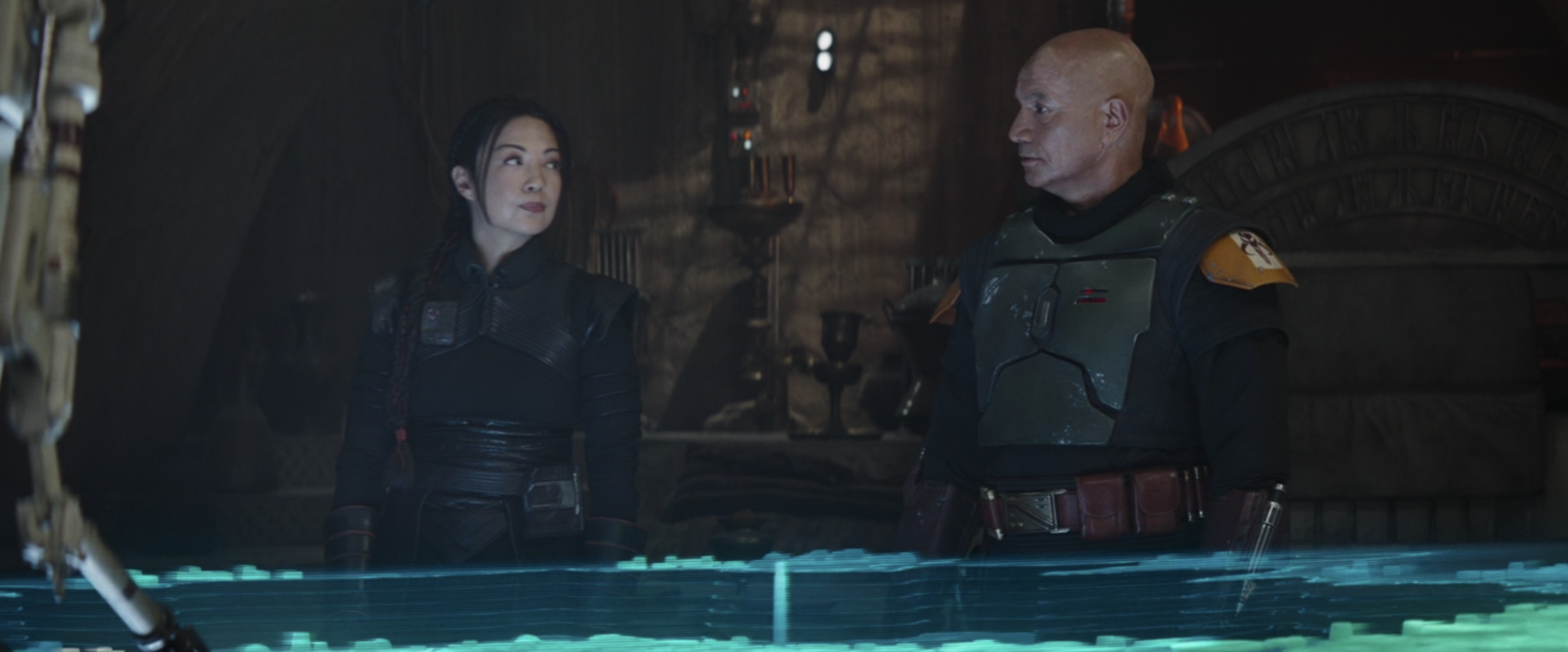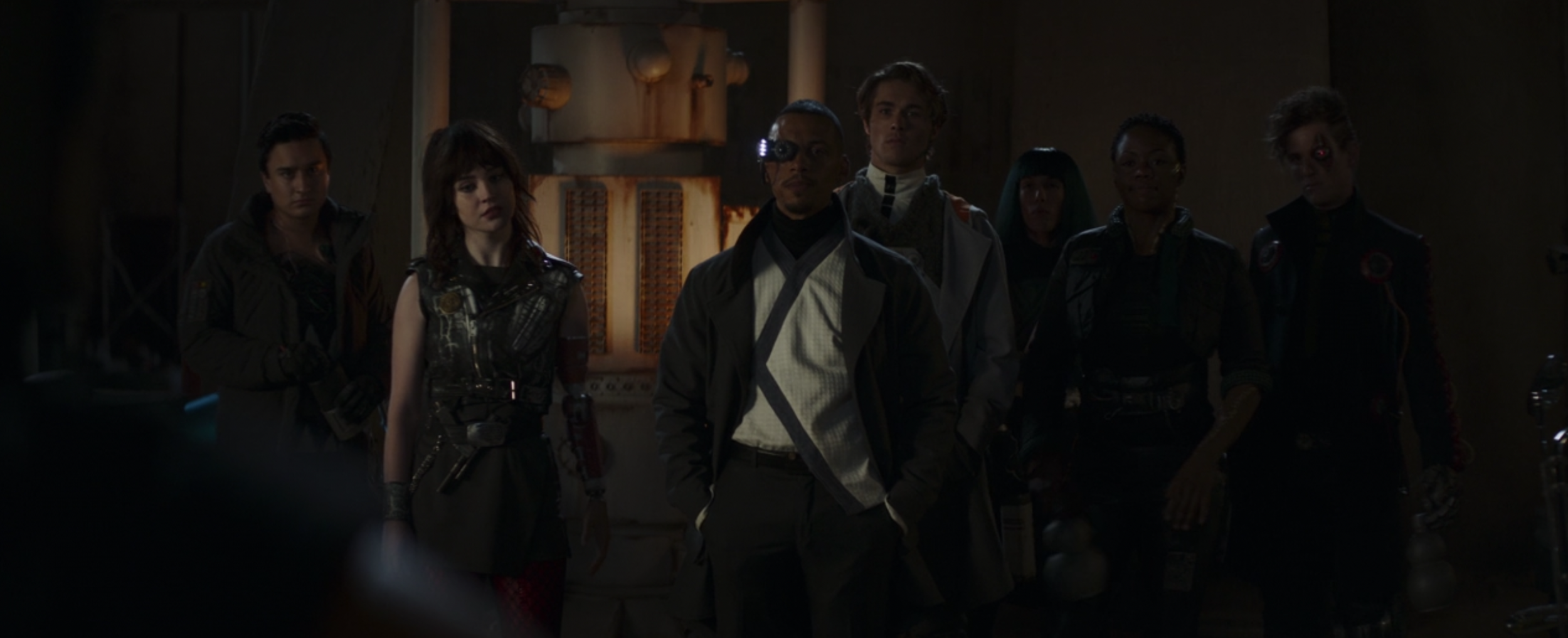Book of Boba Fett Spoiler Recap: The Streets of Mos Espa
Well, that was…certainly something. After the sweeping and deeply moving flashback sequences of last week’s episode, the third episode “The Streets of Mos Espa” brought things to a frustrating - if expected - conclusion where the Tuskens are considered.
Despite the fun we all like to have discussing Star Wars, and the lighthearted jokes that seem to arise out of any given scenario, it does remain a drama at its core. We ultimately go into it knowing lives will be lost, and this is something we understand and accept. So it was with the Tuskens today.
It’s probably fair to say the majority of people I spoke to after last week didn’t expect Boba’s new found family to survive to the present day. But given the care and consideration given last week to really humanize these beings that up until now had been painted as angry, howling savages, I don’t believe anyone expected it to unfold the way it did. Or rather, we hoped it wouldn’t.
The scene occurs during the lone - and short - bacta tank flashback. Boba Fett travels to town to secure protection payments from the Pyke Syndicate, only for their representative to tell him that they already pay the Kintan Striders for the same service. As he is returning to the Tusken camp, he spies a plume of smoke on the horizon, visual shorthand for the twist we all knew was coming. The entire camp was massacred, their tents tagged by the Kintan Striders.
Boba takes the time to burn the bodies, and the weapons alongside them, considering the highly personal value ascribed to each gaffi stick. It’s not as though their loss is diminished by any means. Visually, it’s clear that their deaths upset Boba. Where the problem lies then, is in its presentation.
To get the first major issue out of the way, the trope of harming or killing the more vulnerable - in this case, the marginalized - solely in order to motivate the hero is overdone and it’s tiresome. If this was absolutely necessary for the story, and below I will get into where I think they’re going with this, then it ought to have been presented differently.
This is where the flashback being a by-product of the bacta tank paints the story into a corner. Because these are “dreams” Boba is having, by necessity we the audience must follow him around. Had the scope for the flashbacks been wider, a third-person omniscient rather than limited, to borrow from the literary world, it might have unfolded in a more sensitive manner.
If the Tuskens absolutely needed to lose the fight, perhaps we could have watched them fight back, retaining some of their dignity in the process. These would not then be faceless, nameless bodies who died because they had the misfortune of associating with Boba Fett, but beings with agency who seek to reclaim what was taken from them and ultimately pay the price for the galaxy’s bigotry.
Maybe that wouldn’t be the solution either. It’s honestly hard to say in retrospect. But this is as good a time as any to say that stories that deal with such heavily-coded Indigenous, Bedouin and POC identities need to see the onscreen diversity reflected in the writers room. Of the 19 live-action episodes of Star Wars we have gotten to date, only two of them have not been written by a white man. Rick Famuyiwa is the sole exception, having written both of his episodes of The Mandalorian, and by all accounts the entirety of this season is being written by Jon Favreau, with Dave Filoni pitching in for his upcoming episode as well.
Both men are good at what they do, I am not here to dispute that. But Star Wars television is long overdue writers with varied world views, and a perspective on these stories that doesn’t merely look back at days of Star Wars past. I couldn’t help but feel that the scene at the Tusken camp was reminiscent of Anakin’s own moment with the Tuskens, but obviously seen through a different lens as this time it was not our protagonist who was responsible for the slaughter in a moment of darkness.
Honestly, the differing motivations are too much to unpack here, but I will say this: if you take that much time to humanize the Tuskens (as you should), then you should not have a writer who falls back on the visual language of the worst possible moment these characters have faced onscreen this far.
So how does this look going forward? Frankly, I’m more nervous about the upcoming Obi-Wan Kenobi than I was previously. The reason for this is that initially, British-Iranian writer Hossein Amini was brought on board to write the six-episode series after the planned film fell through. Towards the beginning of 2020 however, it was announced Amini was stepping down and to be replaced with Joby Harold, once again removing the possibility of a POC lens on a world populated with marginalized peoples.
All this to say that while this segment was not particularly lengthy, it cast a long shadow over what was otherwise a rather fun episode that did quite a bit to further the ongoing present-day power struggle in Mos Espa.
At the beginning of the episode, Boba and Fennec are getting a breakdown of the power structure in town from 8D8 when a local water-monger Lortha Peel arrives to petition Boba to do something about the cybernetically enhanced youths that keep stealing his water from him. When Boba and Fennec go to investigate, they realize that Peel was in fact price gouging, a particularly insidious move as according to gang member Drash there’s no work to be had.
This is likely where the connection between Boba’s past and present is drawn. He cannot make everything better for everyone, but he can certainly do his best by those who are being taken advantage of. He offers the entire gang a job as part of his personal cadre and takes them back to be housed in the palace.
Their loyalty is proven fairly quickly, as Boba is woken from his bacta treatment by Black Krrsantan, who has come to kill him. As much as we thirsted over Krrsantan last week, it cannot be overstated how truly terrifying he can be when he wants. With Boba still disoriented, the gang arrives to help him out and fight off the Wookiee.
With Fennec’s help, he is trapped in the empty rancor pit, but things don’t stay as they are for long. Soon the Twins arrive, bearing a sleeping rancor calf as tribute to Boba before announcing that they’re departing Tatooine. It’s not that they fear losing to him, but rather because another syndicate has lain claim to the territory and they aren’t keen to go to war with them.
Wanting to investigate, Boba and Fennec head to Mayor Mok Shaiz’s office to see if he truly is as much of a puppet as they’ve been led to believe. While the Mayor himself is absent, his Majordomo flees the scene and is chased down (in a weirdly slow motorcycle chase, the cause of which I can’t quite determine). The episode concludes with fellow new recruit Skad reporting from the cruiser dock that dozens of Pykes have arrived in Mos Espa, bringing war with them.
The present day plotline does function very well as a continuation of Boba’s character study. The character continues to show what an empathetic, honorable and dare I say it, respectful man he is, with Fennec as a blunt, dry counterpart. Their tension with an undercurrent of unwavering loyalty is still the most fascinating part of the show to me, even if I feel we are woefully short on Fennec screentime generally speaking. I hope the focus shifts more into the present day, or possibly gives us flashbacks from Fennec’s point of view perhaps. And while it’s too late for this season, I also hope we start to see more diverse voices telling the stories we watch in the GFFA in addition to starring in them.
The Book of Boba Fett airs new episodes Wednesdays on Disney+





